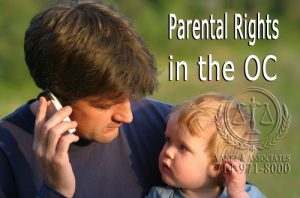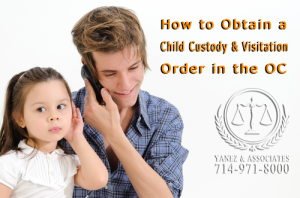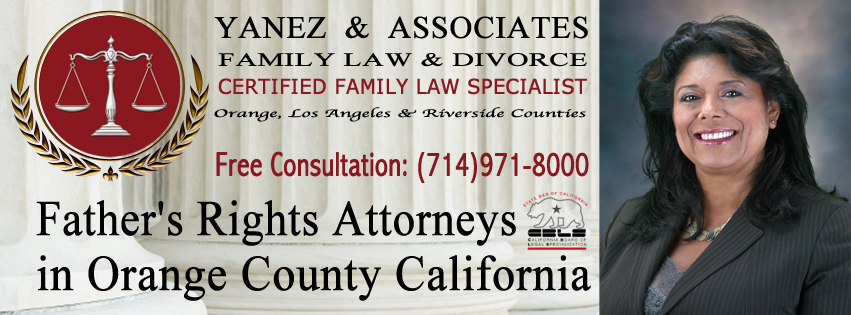Father's Rights Attorneys in Orange County Guide
Father’s Rights Under California Law
All parents have both rights and obligations to their children under California law. In order to establish and modify these rights, a father may require legal assistance.
Parental Rights
All fathers have the right to spend time with their children, as long as the court has not determined that spending time with the father would not be in the best interests of the children. If the parents are not married, a father may spend time with his children according to a child custody or visitation schedule that has been approved by a judge.
Parental rights also include the right to make decisions for the child, including religious decisions, where the child will live or attend school, decisions regarding where the child can spend his or her time, or healthcare decisions. The right to make these decisions may be determined by a child custody order.
Parental Obligations
Fathers and mothers also have an obligation to financially support any children they have. If the parents are not married to each other, a child support may be in place, requiring one parent to make payments to the other on behalf of the children.
However, in order to establish these parental rights and obligations, or to enforce them under the law, legal parentage must be established. Once paternity has been established, a custody, visitation, or child support order can be created, enforced, or modified by the Court.
Establishing Paternity in Southern California
Paternity cases, or parentage cases, are legal cases that result in a determination by the court stating who a child’s legal parents are.
Benefits of Establishing Paternity for a Child in the OC
In addition to allowing the parents to exercise their legal rights or enforce the legal obligations of the other parent, establishing paternity also allows a child access to certain rights and privileges under California law:
• The child has the right to receive financial support from both parents;
• The child has access to legal documents that identify both parents;
• The child can have both parents’ names on his or her birth certificate;
• This allows the child to have access to family medical records and medical histories;
• The child has the right to inherit from either parent; and
• The child can receive benefits from either parent, including health insurance, social security, or veterans benefits.
Once parentage is established, regardless of biological relation to the child, it is very difficult to undo. Each parent will have both equal responsibilities to the child and equal rights to the child.
Married Parents & Presumed Parentage in the Southern California

California law: Married parents or registered domestic partnerships, the husband is assumed to be the father; therefore, paternity is automatically established
Under California law, the if the parents are married or in a registered domestic partnership at the time the child is born, the husband of the mother is assumed to be the father, and paternity can be automatically established.
A man will also be assumed to be the father, under California law, in the following situations:
• He was married to the mother at the time the child was conceived,
• The child was conceived or born during an invalid marriage,
• He married the child’s mother after the child’s birth, and agreed to either support the child, put his name on the birth certificate, or both,
• He has treated the child as his own, even if he is not the biological father.
At this point, the legal rights and obligations of both parents and the child can be enforced.
Unmarried Parents Establishing Paternity in the OC
However, when parents are unmarried at the time of the birth, legal action needs to be taken in order to establish paternity in order to act in the best interests of the child, and in order to obtain a valid and legal court order regarding child custody, visitation, or child support.
A person who does not admit that he or she is the parent of a child may be ordered by the court to submit to genetic testing, however, without a court order, proof that the man is the biological father is not considered legal parentage.
There are two main ways to establish paternity: voluntarily or through a court order.
Voluntary Declaration of Paternity
To voluntarily admit to fathering a child, both parents must voluntarily sign a Declaration of Paternity and file it with the California Department of Child Support Services Paternity Opportunity Program. Usually, this can be done at the hospital where the child is born within a few days of the birth, and the father’s name can be added to the child’s birth certificate.
If, however, it is signed at a later date, the Voluntary Declaration of Paternity must be witnessed by a notary public, and the parents will have to request a new birth certificate in order to add the father’s name.
If it is appropriately signed and filed, a Voluntary Declaration of Paternity is equivalent to a court order establishing paternity. Signing a Voluntary Declaration of Paternity allows parents to exercise their rights to custody of the child, and obliges the parents to provide financial support to the child. A parent who signs a Declaration of Paternity also gives up the following rights:
• The right to a trial to determine paternity of the child;
• The right to paternity tests, including blood tests or DNA tests;
• The right to be notified of any hearings regarding paternity of the child;
• The opportunity to be represented by an attorney regarding paternity; and
• The right to present your paternity case in court or cross examine witnesses.
A Declaration of Paternity Recission is a form that can cancel out a valid Voluntary Declaration of Paternity. It must be filed within 60 days, but issues with revoking parentage can be complicated.
Usually, when this happens, the father uses blood or DNA testing to prove that he is not the biological father, or that the Voluntary Declaration of Paternity is invalid, because it was not voluntarily signed, or was only signed due to false information.
Establishing Parentage with a Court Order in Southern California
You have two options when establishing parentage through a court order. You can request that your local child support agency files a case on your behalf to establish paternity, or you can file a case in court yourself, probably with the help of a paternity attorney in the OC.

Orange County California has a local child support agency, which is organized under the Department of Child Support Services
Filing a Parentage Case Through Your Local Child Support Agency
Every county in California has a local child support agency, which is organized under the Department of Child Support Services. The local child support agencies are there to assist parents in supporting and providing health insurance for children.
When establishing paternity with the help of a local child support agency, it is important to remember that the agency does not represent either parent or the child, and that the information you provide is not confidential, because the agency does not provide you with a lawyer.
When you ask your local child support agency to initiate a parentage case, they will automatically include a request for a child support order.
It is in the best interest of the State of California to establish paternity, because when the parents are both obligated to provide for the child, the state will not have to intervene or provide support. While you do have the right to consult an attorney even if you choose to work through your local child support agency, the decision made by the agency will be legal and final.
To get started with your local child support agency, even if the child is not yet born, call your local agency. Keep in mind that when dealing with any legal matter, it is always best to contact an attorney to help you through the process.
Filing a Parentage Case with the Help of an Orange County Paternity Lawyer
Establishing parentage on your own can be a bit more complicated, and should always be approached with the help of a paternity attorney in the OC. You will need to accurately and completely fill out several forms, file them correctly, and serve the other party, and you may need to appear in front of a judge.
Before looking into paperwork, remember that the case should be filed in the county where the child lives.
With the help of your paternity lawyer, you will need to complete the following steps.
• Select and fill out the appropriate court forms for paternity and child support. Review these forms with your attorney to ensure they have been done correctly.
• Make at least two copies of all forms; one will need to be filed with the court and one will be served upon the other parent.
• Once the other parent has been notified, a proof of service will need to be filed. If you have a process server, he or she will file the proof of service.
• Within 30 days, you will receive a response from the other parent.
Depending on how the other parent chose to respond or not to respond either through the court system or to you, you may need to take further steps to obtain a court order regarding parentage, child custody, visitation, or child support.
Establishing, Enforcing and Modifying Parental Rights and Obligations in the OC

Should YOU be Establishing, Enforcing and Modifying YOUR Parental Rights and Obligations in the OC?
Once paternity has been established, the legal rights and obligations of a father can be established, enforced, and, if necessary, modified. In order to establish parental rights and obligations, a court order needs to be in place.
So, what rights do fathers have regarding their children?
Once paternity has been established, a father has the right to parenting time. If the parents are not married or in a registered domestic partnership, or if they are separated, this may require a child custody order. Depending on the terms of the custody order, a child visitation order may also be necessary.
Custody and visitation orders establish schedules when the children will be in the care of each parent, as well as terms regarding the schooling, religious activities, health care, activities, travel and residence of the child. In California, child custody is determined based on the best interests of the child, and not on the gender of the parent.
What obligations do fathers have regarding their children?
Both parents are equally financially responsible for supporting their child. If the parents are not married or in a registered domestic partnership, or if the parents are separated, a child support order may be necessary to establish the responsibilities of each parent. In California, child support orders are determined based on a host of factors that can vary by county, however, the gender of the parents is not considered.
Parenting Time: Child Custody & Visitation

What can your Parenting Time with Child Custody & Visitation include?
When child custody is decided by the court, it is important to remember that there are two types of child custody that will be included in the order.
Legal Custody
Legal custody determines who can make decisions regarding the child’s life, including the following:
• Child care or schooling,
• The child’s religion, including religious affiliations and activities,
• The mental health of the child, including psychiatric, psychological or other therapy needs,
• With the exception of emergency situations, any decisions regarding the physical health of the child, including dentist, orthodontist, doctors, etc.
• Extracurricular activities in which the child could participate, including sports, camps, vacations, etc.
Legal custody can be either joint or sole. If the parents are granted joint custody, both parents share the right and the responsibility to make decisions regarding the child. Allowing both parents to make legal decisions regarding their child’s life does not mean that they need to agree on every decision, but in order to stay on good terms and out of court, it is best to discuss these decisions together.
If one parent is granted sole legal custody, only one parent has the right and the responsibility to make these decisions on behalf of the child.
Physical Custody
Physical custody determines whom the children live with, which is where they will spend most of their time. Like legal custody, physical custody can be either joint or sole.
If joint physical custody is awarded to both parents, it does mean that the child will spend part of his or her time with each parent. However, it does not mean that the child will spend equal amounts of time with each parent. Usually, the child will spend a little more time with one parent, because it is a more realistic schedule and easier to maintain for both parents. The parent who spends time with the child for the majority of the time is called the primary custodial parent.
The judge can also choose to award sole custody, or primary custody, to one parent, and create a visitation order so that the other parent can spend time with the children.
It is not uncommon for the parents to be awarded joint legal custody, so that both parents can make decisions regarding the child, but for one parent to be awarded primary custody.
Visitation Orders
If the judge chooses to award sole physical custody to one parent, the other parent may be awarded visitation. The purpose of visitation is to allow the second parent to spend time with the children, even if they do not live with him or her. In some cases, a parent’s work or schedule or the location of the parents may factor into the decision to award sole custody and a visitation order rather than joint custody.
Visitation orders can vary based on the unique family situation.
Visitation Schedule - In order to help both parents and children stay organized, a visitation schedule, listing the dates and times the child will spend with each parent, may be issued. Often things like holidays, school breaks, and special occasions will be factored into a visitation schedule order.
Reasonable Visitation - Rather than including specific dates and times, a reasonable visitation order is more open-ended and leaves room for the parents to work out their own schedule, within reason. A reasonable visitation order usually works best for parents who are on good terms, perhaps parents who have gone through a mediated divorce, or parents who are flexible and good at communicating with one another. This may also work for parents whose children are in their teens and have more freedom over where they spend their time.
Supervised Visitation - Some situations require one parent to have sole custody because it is not in the best interest of the child to live with the other parent. These parents may also only be allowed to spend time with the children under the supervision of the other parent, another adult, or a professional. Usually a supervised visitation order will specify the times, dates, and duration of the supervised visits, as well as who will provide supervision during the visit.
Situations where supervised visitation is appropriate may be ones where the parent and child did not have a previous relationship, or when the child’s safety and well-being are at risk. Sometimes supervised visitation is awarded when there is a risk that one parent may abduct the child, has a mental illness, or wants to prove to the court that he or she can work on issues preventing him from being allowed unsupervised visitation or partial custody.
No Visitation - If spending time with one parent could be physically or emotionally harmful to the child, one parent may not be allowed any contact with the child, even supervised visitation.
How are Child Custody and Visitation Determined in California?
A custody order is always made based on the best interests of the child, and no favor is shown, legally, to either a mother or a father. Several factors are considered when a custody order is created:
• The age of the child,
• The child’s health,
• The emotional relationship between the child and each parent,
• Each parent’s ability to care for the child,
• Any history of violence, abuse, or substance abuse within the family,
• Ties the child has to his or her school, community, or home.
Regardless of age or gender of the children, custody cannot legally be awarded based on the gender of the parents. It is important to remember, as a father, that the Court cannot deny your right to either custody or visitation based on your marital status, lifestyle (assuming it does not present a danger to the child), religion, sexual orientation, or disability.
If spending time with both parents would cause harm to the child, or would not be in the best interest of the child, the court may give guardianship to another adult until the parents can care for the child.
How to Obtain a Child Custody and Visitation Order in the OC
If parents want to stay out of court, they may create their own child custody and visitation agreement. However, unless the agreement is signed by a judge and included in a court order, it cannot be legally enforced. This means that even if the parents agree to follow the terms of their agreement, they can choose, at any time, to stop following the terms of the agreement without facing any legal consequences.
In order to create a binding legal order regarding child custody and visitation, the agreement will need to be submitted to a judge, and signed into a court order, which needs to be filed with the clerk. This court order can then be enforced according to the law.
If the parents cannot come to a custody and visitation agreement on their own, an agreement can be made with the assistance of a child custody mediator, or through a meeting with the judge.
Custody Mediation - Like divorce mediation, custody mediation involves sitting down with the other party, or the other parent, and a neutral third party mediator. The goal is to help you and the other parent to create a parenting plan that is in the best interest of the child, allows the child to spend time with both parents, and to help the parents establish lines of communication that will continue as they raise their child together.
In some cases, a judge can request a child custody evaluator to do a custody evaluation before recommending a parenting plan. Parents can also request a custody evaluator on their own or in mediation. Sometimes, during a divorce trial, a judge may appoint an attorney to represent the child.
Modifying a Child Custody Order
Once a custody and visitation agreement has been created, a judge must approve and sign it before it can become a legal custody order. However, as a child gets older, and his or her needs, interests and activities change, the parenting plan may need to be adjusted. Parents’ lives may change as well, as they grow in their new life, potentially with a new partner, additional children, new jobs, or a new home. These changes can affect the ability of a parent and child to spend time together according to an outdated parenting plan.
It is not uncommon for parents to renegotiate the terms of their child custody and visitation agreement every two to three years. There are two ways to change a custody and visitation order.
If parents can agree on the changes, they can create a new parenting plan and use an agreement to adjust the plan. This process is similar to creating a parenting plan on your own or through mediation: the parents need to fill out the appropriate court forms, have them reviewed by a family law lawyer who has experience in child custody cases, have them approved and signed by a judge and file them with the court clerk.
However, if parents cannot agree on the changes to the custody and visitation agreement, one parent needs to file papers with the court, requesting a modification of the order.
In order to legally modify a court order, the parent requesting the modification will need to prove that there has been a change in circumstances since the most recent custody order or modification was made. It is in the best interest of the child to have a stable and consistent custody arrangement with his or her parents, so changing the custody order is only allowed if the change is in the best interest of the child. Therefore, the change in circumstances must be significant enough to render the change necessary.
Modifying a child custody and visitation order requires a legal process, and is best approached with the help of a skilled custody attorney in the OC.
Your attorney can help you select and correctly fill out the appropriate forms, and will review them prior to filing them with the court clerk.
The other parent has the right to be notified of the court proceedings, so he or she must be served with papers. Once the other parent has been served, a proof of service needs to be filed with the court.
In most cases, the parents will need to go through mediation before a hearing will be held. If the parents cannot agree on a modification in mediation, the case will go to Court and a judge will decide whether to modify the order, and a new agreement will be signed into a court order.
Child Support Orders in Southern California
Child support is an amount of money that one parent, or both parents, are legally required to pay every month in order to provide financial support for the child. It is in the best interest of the State of California for every parent to support his or her children, so every county in California has a local child support agency which offers services to help parents obtain and modify child support orders, and collect support or enforce orders.
Child Support and Child Custody Orders in the OC
Child support orders are made separately from child support orders. It is not legal to keep a parent who has a right to see his or her child, under a custody order or a visitation order, from seeing that child because the parent refused to pay child support. It is also illegal to refuse to pay child support if the other parent is keeping you from spending time with your child, against the terms of a child custody or visitation order.
Child support and child custody are only related because the amount of child support owed, and who pays what amount is partly determined based on the amount of time each parent spends with, and is responsible for the child.
Initiating Child Support in California
In California, each parent is equally responsible for the financial support of the child. In order for the court to enforce this obligation, a child support order needs to be in place once paternity has been established.
A child support order can be requested in several situations, including during a divorce, legal separation, or once paternity has been established. If you are a father and you are in the process of a paternity or custody suit, consider child support.
Calculating Orange County Child Support Orders
Every family, child and family situation is unique, and child support orders are created based on several factors regarding the life of your child.
In California, there are state guidelines for calculating the amount of child support in each case. The state considers the following when determining child support:
• The amount of money the parents earn, or have the potential to earn,
• The amount of income each parent receives,
• The number of children the two parents have together,
• The amount of time each parent spends with the child. This may be dependent on a child custody or visitation order,
• The tax filing status of the parents,
• Any support the children are receiving from other relationships,
• Expenses related to health care and health insurance,
• Financial obligations of either of the parents, like retirement contributions or union dues,
• Expenses related to the child’s life, including hobbies, extracurricular activities, and education,
• Child care required to allow a parent to attend training or work,
• Transportation for traveling between parents according to the visitation and custody schedule,
• Other factors may also be included.
Child support is usually required until the child turns 18, or 19 if the child is still in high school full time, living at home, and is not yet self supporting. It can also end if the child marries, joins the military, is emancipated, or dies, unless the parents opt to support the child longer. The Court may also order that the parents support the child longer if the child is disabled and cannot support him or herself.
Enforcing a Child Support Order
If, as a father, you are owed child support by your child’s mother, and the mother fails to pay child support, fails to pay on time, or fails to pay in full, you may file contempt of a court order against her.
In California, if a parent falls behind on child support payments, that parent is required to pay interest on top of the full amount of child support owed. Any missed child support payments that are due on or after January 1, 1983 accrue interest of 10 percent per year.
If you do take your child’s mother to court for contempt of a court order and it has been found that she is able to pay, but has chosen not to, she may be held in contempt of court, and she will be legally required to pay the child support and interest. If she refuses to do so, you may ask the Court to garnish her wages. Even if she does make installments to cover the amount of missed payments, interest will still be added to current child support owed until she has caught up.
Modifying a Child Support Order
If, according to a child support order, you are required to pay child support, missing payments is not okay for any reason. However, if there is a change in circumstances, either parent can modify the child support order to accommodate those new circumstances.
A change in circumstances that might require a modification to a child support order will affect either the financial needs or the income of the family.
• A change in either the income of either parent could be a reason to modify a child support order;
• A change in the amount of time that either parent spends with the child is also a reason to modify a child support. This can happen if a child custody or visitation order changes, or naturally, as the child grows older and chooses to spend more or less time with a parent, or more time on his or her own.
The Court will make a decision about the modification of child support based on the current family situation, and the amount will be determined in the best interest of the child. Requesting a modification does not mean that the amount owed will go down. The parent who owes child support will owe support in the amount listed in the child support order until it has been modified.
Father’s Rights Attorney in Orange County, California
If you’re looking for an attorney in the OC who is skilled with father’s rights, contact Yanez & Associates. Our compassionate attorneys have the knowledge and experience to ensure that your rights as a father are protected. Give us a call today to schedule your free initial consultation.





















